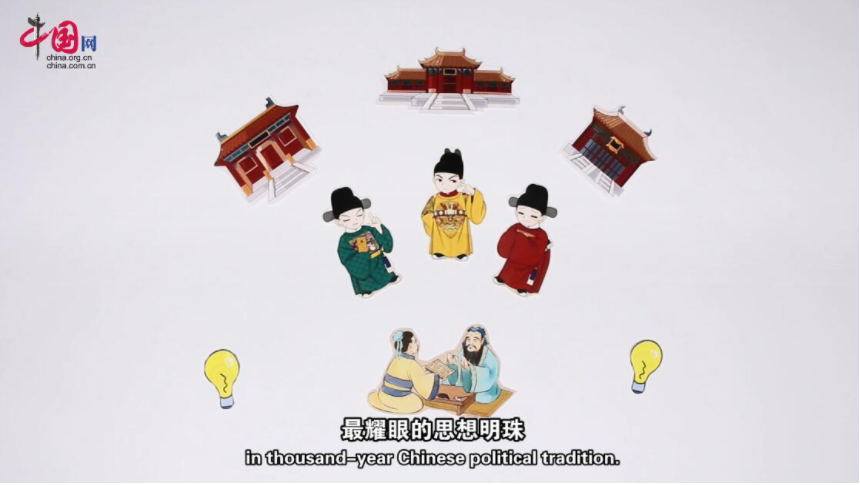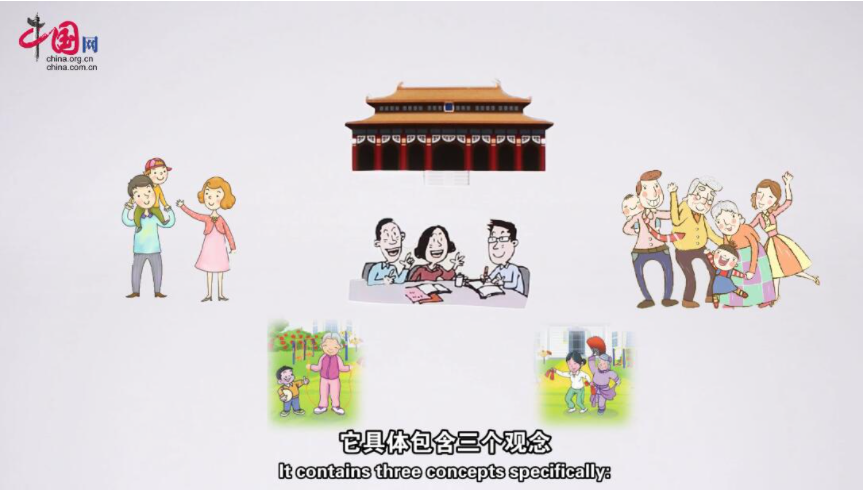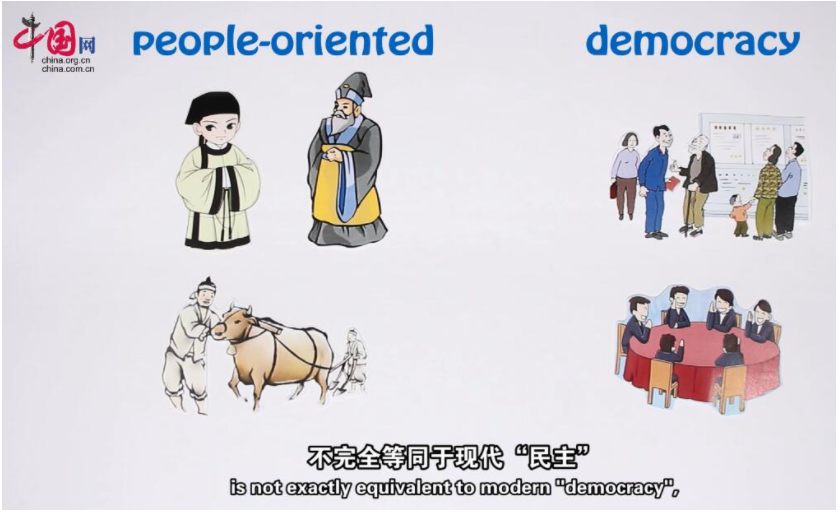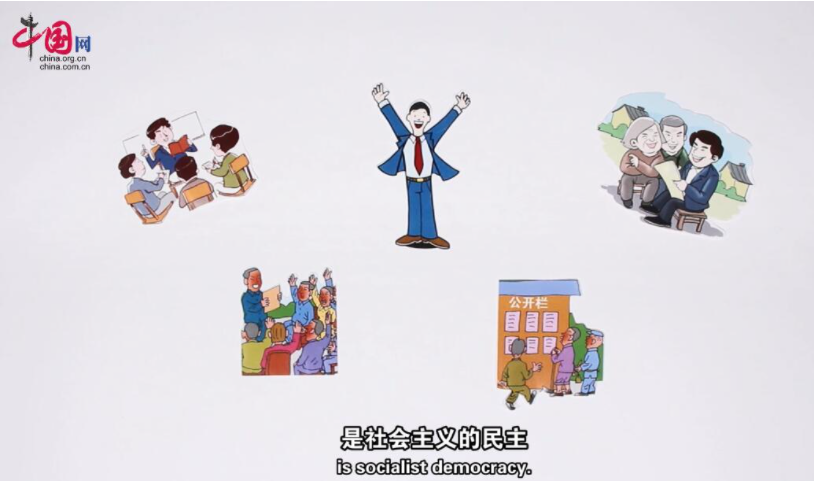“民本”思想在中华文化史上源远流长,是几千年的中国政治思想传统中,最耀眼的思想明珠。
Possessing a long history in Chinese culture, “people-oriented” thought is the most brightest pearl in thousand-year Chinese political tradition.
夏商周时期,人们不再相信鬼神,而是逐步认识到人自身的力量。
During the period of Xia, Shang, Zhou, people no longer believed in spirits, but realized the power of human being gradually.
《尚书》记载:“民为邦本,本固邦宁。”
According to Shangshu (the book of history),“people are the basics of the country and people consolidate the peace of the country.”
这是中国古代民本思想的渊源,算起来已经有4000年的历史了。
This is the origin of ancient Chinese “people-oriented” thought, which enjoys a history of four thousand years.

春秋战国时期,民本思想被儒家学派进一步阐释和发展。
In the Spring and Autumn Period and the Warring States Period,“people-oriented” thought is further explained and developed by Confucianism.
从汉武帝独尊儒术开始,儒家的民本思想被中国历代统治者奉行。
From the respecting only Confucianism by Emperor WU of Han Dynasty, “people-oriented” thought has been pursued by ancient Chinese rulers.

中国的“民本”思想,就是政治要“以民为本”。它具体包含三个观念:
Chinese “people-oriented” thought means “people is the orientation” in politics. It contains three concepts specifically:
一,“立君为民”。国家与君主的权力来源于人民。
First, “setting the monarch for the people”. The power of country and emperor comes from people.
二,“民为邦本”。国家政治稳定的基础就是人民。
Second, “people are the foundation of a country”. The basic of a steady country is people.
三,“爱民养民”。执政者的目标就是能让百姓过上好日子。
Third, “love people and support people”. The objective of governor is to make people live a better life.
“民本”既是中国古代的一种政治理念,也是一项道德原则。
“People-oriented” thought is not only a kind of political ideology in ancient China, but a moral principle.
既用于处理政治问题,也体现了“仁爱”的道德追求,是中国古人的根本道德追求在政治领域中的具体化。
It could be used to deal with political issues, demonstrate moral pursuit of “benevolence”, which is a materialization of ancient Chinese’s fundamental moral pursuit in politics.
尽管传统“民本”思想不完全等同于现代“民主”,但二者有重要的共同之处。
Although the traditional idea of "people-oriented" thought is not exactly equivalent to modern "democracy", they have important commonalities.

今天,我们所主张的民主,是社会主义的民主。
Nowadays, the democracy we advocate is socialist democracy.
其核心是人民当家作主,强调人民群众的利益是一切工作的出发点和落脚点,体现了民本思想中“民利至上”和“重视民意”的崇高道德追求。
Its core is the people are masters of the country, emphasizing people’s interest as start point and stance of all work, which demonstrates noble moral pursuit of “supreme of people’s interest” and “value public opinion” in “people-oriented” thought.
当今中国走的是有中国特色的社会主义道路,实行的是一种新型的民主制度,这种制度是在马克思主义民主观和中国传统民本思想基础上的综合创新。
Nowadays, China is taking the socialistic road of Chinese characteristics, conducting a new type of democratic system, which is comprehensive innovation on the basics of Marxist view of democracy and traditional Chinese “people-oriented” thought.

民本思想至少在以下几个方面对我们有借鉴意义:
“People-oriented” thought possess referential significance in at least the following aspects:
一, 执政为民。人民是国家的根基、是执政的根本,所以执政者必须体察民意。
First, governing for people. People are the foundation of a country and basic of governance, so governor must listen to people’s opinion.
二, 富民利民。只有让老百姓过上衣食无忧的富足日子,才能得到他们的真心拥护。
Second, enrich the people and benefit the people. Only when people have a rich life without the concern of basic living stuff, could they support governor sincerely.
三, 取信于民。诚信是一个国家最不可缺少的资源。
Third, win trust from people. Honesty is the most indispensable resource for a country.
四, 开民言路。实施政务公开,加强舆论监督,是现代民主政治的重要特征。
Fourth, open channels for people to make comments. It is significant traits of modern democratic politics to publicize political affair and enhance supervision by public opinions.

“重民本”的思想虽然产生于遥远的古代,但它是中国的优良政治传统,是政治活动最终追求的目标,也是实现天下大治的根本。
Even though “people-oriented” thought comes from ancient China, it is an excellent Chinese political tradition, the final objective of political activity and foundation of governance.
在今天,民本思想仍然具有重要的当代价值,是社会主义核心价值观中“民主”的重要源泉,值得我们吸收和借鉴。
Nowadays, “people-oriented” thought still possesses significant contemporary value, which is important resource of democracy in socialist core values and worth absorbing and reference.